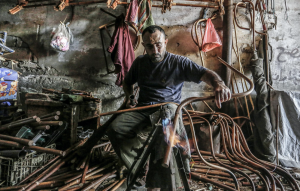They are also two to three times more likely to die as a result of pregnancy than white women, according to the CDC
The repeal of federally protected abortion rights would result in an increase in violence experienced by Indigenous women, girls and all those who birth, predicted the director of one of the leading research institutes on Indigenous and Alaska Native people across the US.
“The only option we have right now if this was to be overturned, is to provide the limited resources and support, but it will be limited, especially initially. As a direct result our people are going to suffer,” Abigail Echo-Hawk, director of the Urban Indian Health Institute, told the Guardian.
Her remarks followed a leaked supreme court draft opinion authored by Justice Samuel Alito that showed the country’s highest court ready to overturn Roe v Wade, the nearly 50-year-old ruling protecting the right to an abortion until a fetus is viable outside the womb. Should that decision become official, 13 states with trigger laws would immediately in effect outlaw abortions. Many other Republican-controlled states are expected to follow suit.
A 2016 National Institute of Justice study found that more than one in three Indigenous and Alaska Native women had experienced violence in the past year, including sexual violence and violence by an intimate partner. They were 1.7 times more likely than white women to be the victims of violence. They are also at an especially high risk for being trafficked, although comprehensive data is limited.
The high rates of these crimes – many of which are never reported, probably due to a mistrust in law enforcement – compounded with not being able to access legal abortions, can leave Indigenous people at an increased risk, explained Echo-Hawk.
For those in an abusive relationship, not having access to an abortion could force the victim to stay in a bad situation and lead to more violence, she said. Those being trafficked, some of whom are not allowed to use birth control, may face additional violence from their perpetrators should they become pregnant.
Indigenous and Alaska Native women along with Black women are also two to three times more likely to die as a result of their pregnancy than white women, according to the US Centers for Disease Control and Prevention (CDC).
Echo-Hawk said having to access unsafe abortions or experiencing the mental anguish of being forced to go through a pregnancy could increase these numbers.
“That mental health and the mental violence which we’re experiencing, that has a direct impact on a person’s body when they are going through pregnancy, and it can directly result in pre-term birth and maternal mortality as a direct result,” she said. “So, we’re actually battling mental violence that continues to be perpetuated against us.”
A lack of reproductive autonomy
Advertisement
For decades Indigenous people were subjected to forced sterilization in the US, with the practice peaking in the mid-20th century. Repealing Roe v Wade would shift the scales of their reproductive autonomy – or lack thereof – to a new and dire extreme, explained Kerri Colfer, senior Native affairs adviser for the National Indigenous Women’s Resource Center.
“Native people are still dealing with the trauma of colonization, historic violence against Native people, forced sterilizations, Indian child removal and boarding schools … being forced to carry pregnancy is a really traumatic thing, whether that is a pregnancy that resulted from assault or not. And now we’ll have another generation with that trauma to carry on,” she said.
The Indian Health Service provides health care to about 2.6 million Indigenous and Alaska Natives. But the agency, which is within the US Department of Health and Human Services, restricts abortions to those in which a mother’s life is at risk or in cases of rape or incest that have been reported within 60 days.
Echo-Hawk, who was a co-author of an amicus brief submitted to the supreme court on this issue last year, said as part of that effort, her organization looked at 33 IHS-funded facilities. They found that between 2002 and 2021, only seven Indigenous women were documented as visiting an IHS facility for an abortion.
Instead, some Indigenous people seek abortions outside these facilities, she explained. Repealing Roe v Wade would mean that Indigenous people, some of whom live in extremely rural and poverty-stricken areas, might have to travel much further, to facilities outside their state.
She asked: “How are we going to afford that travel?”
Since 2014, Indigenous Women Rising, an Indigenous-led and -centered reproductive justice organization, has helped hundreds through its abortion fund by contributing funding for the procedure, as well as for gas, hotels and childcare.
Rachael Lorenzo, its executive director, said if Roe v Wade is overturned, they will need to keep close track of the abortion policies in the states they serve the most, including North Dakota, South Dakota, Arizona and Oklahoma, and willprobably need more funds. The organization has several fundraising events scheduled, including a barbecue cookout for rural communities in southern New Mexico and a two-stepping fundraiser.
“People are scared, and they’re angry, and they’re frustrated. And so am I,” said Lorenzo, a descendant of Mescalero Apache, Laguna Pueblo and Xicana. “But we also deserve joy. And if there’s any way we can merge the two, by taking action and not letting ourselves get consumed with how scary this is … that’s really where our energy is going to be.”




